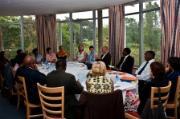
The Deputy Minister of Science & Technology, Mr Derek Hanekom, visited Rhodes University last week to discuss issues surrounding Maths and Science education in Grahamstown.
The meeting took place at the request of the Deputy Vice-Chancellor: Academic and Student Affairs, Dr Sizwe Mabizela, who together with a group of concerned educationists, would like to see Grahamstown become the premier centre in the country for Maths and Science education.
This ought to be possible if resources are pooled and all the current initiatives and support projects in the town work together, and it would mean moving from merely hosting Scifest Africa once a year to creating a legacy that has a more lasting and far-reaching effect.
Present at the meeting were the Director of the CSD, Ms Vera Adams, Director of Community Engagement at Rhodes, Ms Di Hornby, Project Director of Upstart, Ms Shireen Badat, Director of the Grahamstown Foundation, Ms Louisa Clayton, representatives from the district office of the Department of Education, the principal of Oatlands Primary School and a representative from Nombulelo Secondary School, Ms Joyce Sewry from the Chemistry Department, retired Judge Cecil Somyalo and his wife, and Dr Mabizela. Accompanying Deputy Minister Hanekom were two members of staff of DST, Ms Tebogo Gule and Ms Nthabiseng Maoela.
While those present outlined their activities and what their concerns were regarding educational issues in Grahamstown and the district, a large part of the meeting focused on the proposed use of an old administration building in Joza as a community centre and education hub.
The old Administration Building is potentially available to serve as a centre where a number of different education-related NGOs and initiatives could be based, while doubling up as a space for community activities. It is believed that such a multi-purpose centre could serve as a model for the rest of the province, or even the country.
The proposal is that a Maths and Science centre should serve as the hub of the centre, and that the Dept of Science & Technology be approached to provide the necessary funding. Deputy Minister Hanekom was not averse to the idea, as it is in line with one of the stated objectives of his Department which is to create a science centre in every province, but said a written proposal would have to be submitted for consideration.
Mr Hanekom went on to describe an exciting pilot project that is to be launched in the largely rural district of Cofimvaba, involving the use of new and green technologies at schools for building, sanitation, etc. as well as the expansion of computer access and connectivity. While he conceded that it was bad news for Grahamstown that the Makana district had not been chosen, he felt it was close enough for areas of co-operation to be developed, especially with regard to research.
Mr Hanekom shared with the group his vision which he had discussed with Dr Mabizela a few years ago of creating a science academies around the country where the top Maths and Science pupils will be drawn together from all schools in the country in order to develop a cadre of excellence that can kick-start the momentum of producing more scientists in the province and the country. He asked the group members to share their views on such an initiative.
Deputy Minister Hanekom embraced the spirit of the round-table discussion and engaged the participants throughout in a frank, open and amicable manner, inviting those present to call on him to make project visits or discuss proposed initiatives, as Makana municipality is his constituency and he is quite often in the area.
By Cathy Gush
Photo by Adrian Frost
